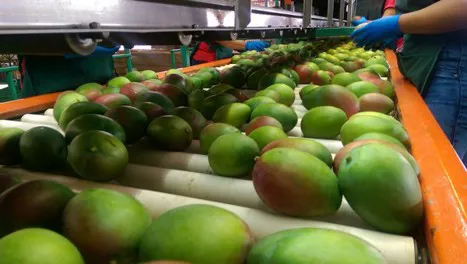Following Hurricane Fiona sweeping through Puerto Rico in mid-September, there’s no doubt that the island now will rely more heavily on imported product. Martex Farms in Santa Isabel, Puerto Rico is a tropical fruit grower in the Southern part of the island growing mangoes, a largely exported product, and also bananas, plantains and tropical avocados which are domestically distributed products.
“Fiona was mostly a rain-filled event. We did sustain hurricane-force winds, especially in the south and southwest of the island. But the major issues are associated with flooding and rainfall,” says Veny Marti of Martex. “In our area, we sustained some water and rainfall damage, mainly runoff and some standing water. But for the growers in our area, the main issue was wind. We had 75 MPH winds in our farms and that was enough to cause damage.”
The main concern is around the banana and plantain fields which Marti says were completely destroyed, particularly the fields that were bearing fruit at the time of the hurricane. “Those plants fell to the ground and were lost,” he says.
 Veny Marti says the fruit trees did better in Hurricane Fiona than they did in 2017's Hurricane Maria.
Veny Marti says the fruit trees did better in Hurricane Fiona than they did in 2017's Hurricane Maria.
Fruit loss vs. tree loss
However, the fruit trees did better in Hurricane Fiona than they did in Hurricane Maria back in 2017. “The fruit trees sustained damage but it was not extremely extensive damage. We lost mostly our crop but the trees themselves did okay. It wasn’t like Hurricane Maria where a significant number of trees were lost,” he says, noting of course when a tree is lost, it can take six to 10 years for a replacement tree to reach the same maturity.
This means the short-term concern is for the loss of income around the banana and plantain crops. “We’re looking at a loss of revenue for the next five to six months,” says Marti. “We’re not going to have any product to sell until May of 2023.”
However, the fruit trees will likely come back earlier. “We’re starting to get flowers and hopefully that new production is going to be ready for picking sometime around March-April. Mangoes will hopefully have production earlier than the other crops,” he says.
 Martex Farms is a tropical fruit grower in the Southern part of the island growing mangoes, a largely exported product, and also bananas, plantains and tropical avocados which are domestically distributed products.
Martex Farms is a tropical fruit grower in the Southern part of the island growing mangoes, a largely exported product, and also bananas, plantains and tropical avocados which are domestically distributed products.
Timing of vegetable production
Meanwhile, vegetable production almost caught a break. The wind wasn’t so much an issue for vegetable production but the rainfall was. “The good thing is that vegetable production season has not quite started yet. Most of the vegetable farmers were starting to prepare their fields and typically they start planting in October-November,” Marti says. “So they lost all the terrain preparation they’d done but most of the vegetable fields were not planted yet.”
In addition, road work is underway on roads surrounding farms so crews can get in to maintain the trees to bring production back online.
This of course means that Puerto Rico, an island that already relies heavily on imports for food, will do so even more now, particularly for the next six months to a year. “Imports are mostly coming from the U.S.--as close as Florida but as far away as California. Everything has to be consolidated in Florida because Jacksonville is the main lifeline port for imported food for Puerto Rico,” says Marti.
However, following Hurricane Ian making its way through Florida more recently, the worry now is about the availability of logistics. “The availability of trucks and space in Jacksonville is of great concern to us, especially in the short run. Floridians are going to need a lot of the same things we do and it’s easier to service them,” he says. “If things were expensive already because of the pandemic and the inflationary pressures, it’s going to get even worse for us. Especially since we’re approaching the times of the year when food is extremely important--the holiday season.”
 For more information:
For more information:
Veny L. Marti
Martex Farms
veny@martexfarms.com
https://martexfarms.com
